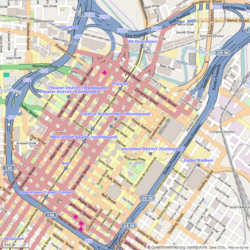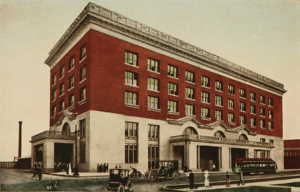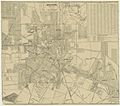Union Station (Houston) facts for kids
|
Union Station
|
|
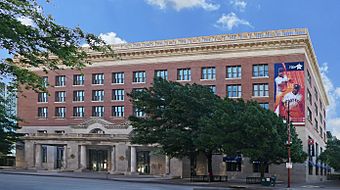
The building in 2020
|
|
| Location | 501 Crawford St., Houston, Texas |
|---|---|
| Area | 1 acre (0.40 ha) |
| Built | 1911 |
| Architect | Warren & Wetmore |
| Architectural style | Classical Revival |
| NRHP reference No. | 77001448 |
Quick facts for kids Significant dates |
|
| Added to NRHP | November 10, 1977 |
Union Station is a famous building in Houston, Texas. It opened on March 2, 1911. For many years, it was a very busy place where trains arrived and departed. Today, this historic building is part of Minute Maid Park, a baseball stadium. It is officially recognized as a special place on the National Register of Historic Places.
Contents
Union Station: A Historic Hub
Building a Grand Station
In 1909, a company called Houston Belt and Terminal Railway decided to build a new main train station for Houston. They hired architects from New York City, Warren and Wetmore, to design it. To make space for the station, some important buildings in Houston had to be taken down.
Union Station was built by the American Construction Company. It was a very expensive project. The outside walls were made of strong materials like granite, limestone, and terracotta. Inside, there was a lot of beautiful marble. The station was finished and opened on March 1, 1911. At that time, Houston was a major train center in the Southern United States. This is even shown on the Seal of Houston, which has a train on it! The next year, two more floors were added to the building.
Trains Come and Go
For over 70 years, Union Station was the main place for people to catch trains in Houston. Many different train companies used the station. People could travel to cities like Dallas, Denver, Minneapolis, St. Louis, and New Orleans.
Some of the major train lines that served Union Station included:
- Burlington Northern
- Chicago, Rock Island and Pacific Railroad
- Missouri Pacific Railroad
- Atchison, Topeka and Santa Fe Railway
Other train companies, like the Southern Pacific Transportation Company and the Missouri–Kansas–Texas Railroad, had their own stations nearby.
| Preceding station | Atchison, Topeka and Santa Fe Railway | Following station | ||
|---|---|---|---|---|
| Terminus | Houston – Galveston | Mykawa
toward Galveston
|
||
| Via Burlington-Rock Island Railroad | ||||
| Preceding station | Burlington Route | Following station | ||
| Tomball
toward Denver
|
Denver – Houston | Terminus | ||
| Preceding station | Chicago, Rock Island and Pacific Railroad | Following station | ||
| Tomball
toward Minneapolis
|
Minneapolis – Houston | Terminus | ||
The End of an Era
After World War II, fewer people traveled by train. In 1971, a new company called Amtrak took over most long-distance train services. Amtrak used Union Station for a while, but it also used another station in Houston. It soon became too expensive for Amtrak to keep both stations open.
The last regular train to stop at Union Station was the Lone Star. It moved to the other station on July 31, 1974. After this, Union Station was no longer a public train station. It was used as office space and a control center for the railroad companies. On November 10, 1977, the building was added to the National Register of Historic Places. This means it's a special building worth protecting.
A New Life as a Ballpark Entrance
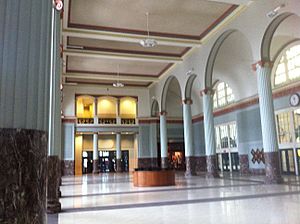
In the mid-1990s, people started planning a new baseball stadium for Houston. They wanted to replace the old Astrodome. At first, they thought about building it in a different area. But then, a businessman named Kenneth Lay suggested building it downtown, and he offered to help pay for it.
This led to the idea of building the new stadium around Union Station. The station itself would be saved and used as the main entrance to the ballpark. Construction of the new stadium, first called Enron Field and now known as Minute Maid Park, was completed. It opened on April 7, 2000. Today, Union Station's beautiful lobby welcomes baseball fans to the park.
Images for kids
 | Jackie Robinson |
 | Jack Johnson |
 | Althea Gibson |
 | Arthur Ashe |
 | Muhammad Ali |


